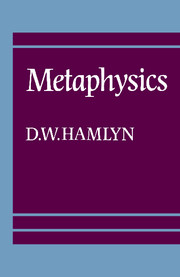6 - Simple substances: Monism and pluralism
Published online by Cambridge University Press: 05 June 2012
Summary
Must substance be simple?
As we saw in Chapter 4, it is not part of the Aristotelian tradition about substance or indeed of our ordinary thinking about substances (if there is any such thing) that substances are simple. It might indeed be said that they are quite the contrary. The things that we should ordinarily think of as substances are complex both in the sense that they have a multiplicity of properties and in the sense that they are spatially divisible. Moreover, it is important to note the point which in Chapter 4 I mentioned as recognized by Plato – that the predicate ‘one’ is a relative term so that whether something is counted as one or many must depend on the answer to the prior question ‘One what?’ The thought that substances must be simple is the same as the thought that they must be one in an absolute sense.
It is Leibniz, among philosophers concerned with substance, who seems most concerned also with the simplicity of substances. It is arguable that he thought that they must be simple, and not merely in possession of the spurious unity which attaches, as he put it, to sacks of pistoles (i.e. the unity of a mere collection), because he thought that this followed from the fact that substances are primary as regards existence. In other words, he thought that substances must be absolutely simple because any complex thing, whether that complexity is actual or potential, is capable of being analysed into, and is thus dependent on, the things of which it is a complex, and so cannot be primary.
- Type
- Chapter
- Information
- Metaphysics , pp. 105 - 126Publisher: Cambridge University PressPrint publication year: 1984

